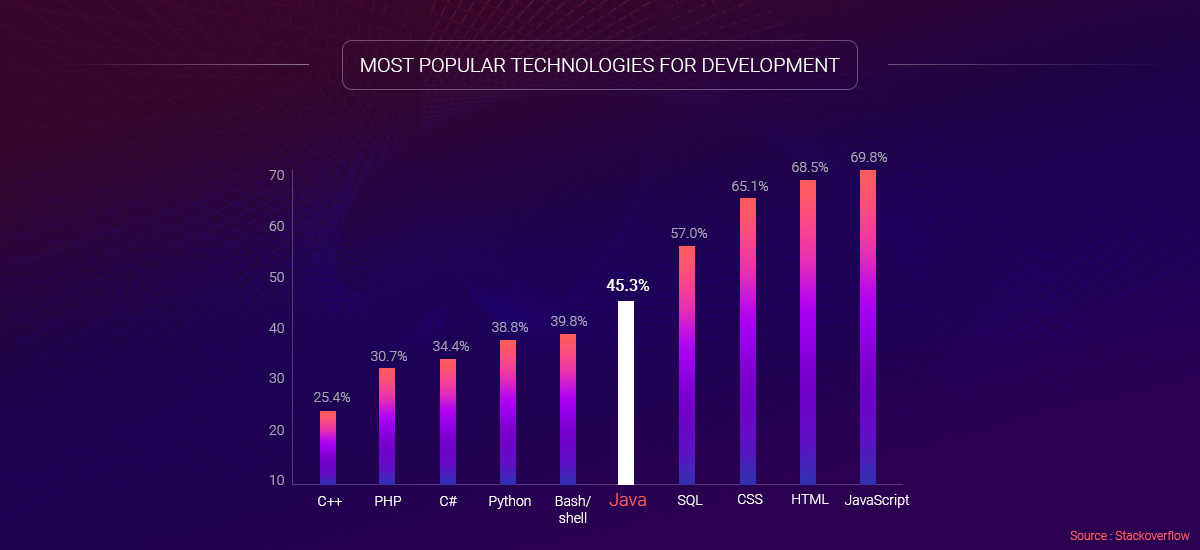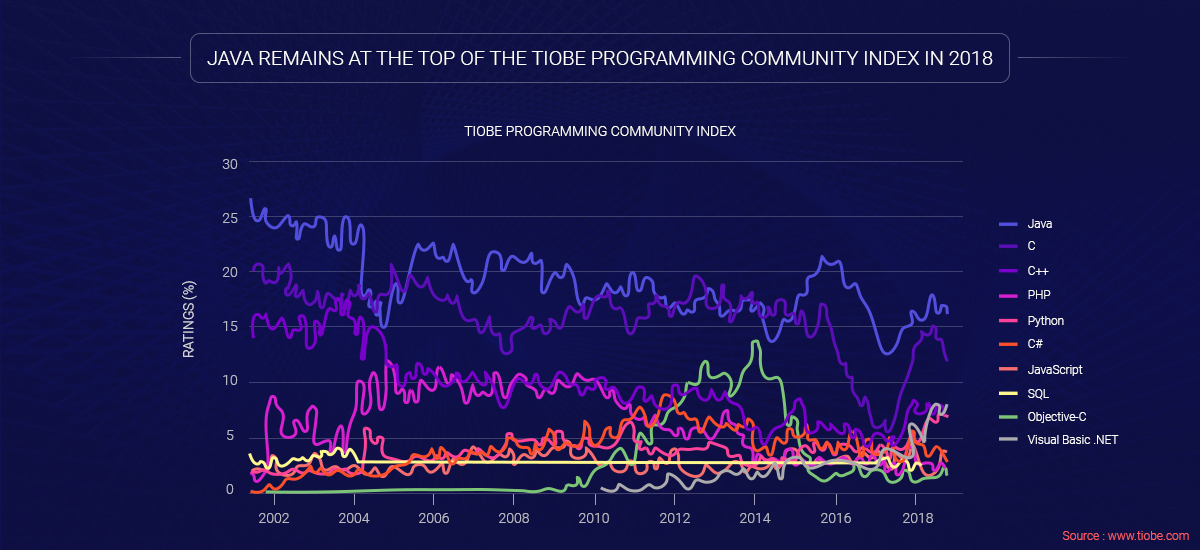Why and When to Use Java for Developing Your Application
Java is here to stay.
Join the DZone community and get the full member experience.
Join For FreeJava is a general-purpose language that follows the object-oriented programming style with a Write-Once-Run-Anywhere approach to development. It was designed for an interface with Internet-enabled devices, and over the course of the last two decades, this particular design choice has ensured Java’s relevance in the developer community.
Even now, in 2019, Java is ubiquitous and often used to develop virtually everywhere and on every platform; from smartphones and Android devices to websites, video games, cars, and even IoT devices.
In 2019, even the layperson is concerned with their data’s security and privacy and has devices that are connected all of the time. Java fits into these requirements perfectly, as it can easily run on devices lacking powerful hardware and, in a way, make these devices ‘smart.’
This brings us to the question: why Java?

As seen in the chart above, Java remains the most widely used programming language and the fifth most popular development technology overall.
Below are the main reasons why Java remains a top choice for developers worldwide.
Multithreading
Java supports multithreading, which allows applications written in Java to balance their load on multiple, independent threads (smallest possible units of processing). Each thread is monitored until it’s assigned task ends. Multithreading has several benefits. It results in quick response times, as commands are processed virtually instantaneously even when several tasks are assigned.
This also results in better overall performance, as multithreading allows apps to more efficiently use hardware resources.
Memory Management
Managing memory consumption can be a taxing task for any programmer, and it is essential to do it right as it is linked with the application's performance and effectiveness. With Java, developers don’t have to worry about memory management as it performs automatic memory management and garbage collection.
Basically, Java objects are stored in what is known as a “heap.” Once this heap grows too large, automatic garbage collection is performed and inactive objects are removed from the heap.
Scalability
A major reason for Java’s continued use is the level of scalability that it provides. Being a simple, object-oriented language, Java makes it extremely easy for developers to scale up their applications horizontally or vertically. This allows for less development needed to gain performance improvements for one’s Java applications.
Multi-Platform
Sun Microsystems would describe Java’s multi-platform capabilities as “Write Once, Run Anywhere,” and this statement holds true. Developers can create a Java program for the Linux platform and run the same code with minimal changes on another platform like Windows. This will work on any platform that can support JVM as JVM acts an interpreter of sorts between the code and the hardware.
Another fact to keep in mind is that Java was designed to run on varied devices, especially if they could support Internet connectivity. This adds a whole other dimension to Java’s multi-platform capabilities.
Security
While no Technology is a 100 percent secure by default, Developers can use certain technologies strengths to shore up security loopholes. To its advantage, Java offers several in-built security features that developers can take advantage of to create secure and robust applications.
A few such attributes are:
Security Manager
Java allows security policies to be created for individual applications to which developers can apply different access rules.
Cryptography
Java applications can access comprehensive APIs consisting of message authentication codes, ciphers, digital signatures etc. Developers can choose to integrate these APIs to boost the security of their applications.
Java Apps can be run in “isolation”, almost as if existing independent of anything else which negates security risks posed by applications in a network.
Community Support
Having existed for over two decades has given Java a major advantage over other technologies. It possesses possibly the largest community support amongst competing technologies and has a large amount of documentation which comes in extremely handy.
This community support, as well as support by Oracle and Sun Microsystems, has given Java a stable outlook. Not to mention the fact that Java continues to be updated with new features annually and is generally kept abreast with the latest development trends.
So, Where Should One Use Java?
Although Java is an incredibly versatile technology, it is better suited to some industries and use-cases more than others.
Its inherent attributes give it a unique advantage in certain tasks and situations, which are listed below.
Enterprise
Java forms the backbone for several Enterprises including Fortune 500 companies. It is the most used runtime platform on over 97 percent enterprise systems.
According to Oracle, over a billion devices run Java in some form. Most companies use Java for some function or the other.
The vast number of Libraries supported by Java, it’s inherent security and robustness as well as its extensive documentation make Java Development Services extremely lucrative for Enterprises.
It also helps that Java can run on virtually any machine, which can significantly reduce costs.
Internet of Things (IoT)
The Internet of Things is in the process of revolutionizing how people live their daily lives, and Java has had quite a role to play in its success. While smartphones and laptops are integral devices when it comes to setting up IoT environments, it’s easy to gloss over the fact that there are several smaller devices that have low powered CPU’s. These devices can be anything from refrigerators to thermostats, to car stereos to virtual assistants and wearables. Due to Java’s versatility, applications, and functionality for the aforementioned devices are often written in Java.
It is easy for developers to put limits on how much memory a Java app will consume. This, in turn, is aided by Java automatic memory management techniques, which prevent the low powered and specked hardware in these smart devices from getting overloaded.
Smartphones
Over 85 percent of mobile devices run Android OS, and Android applications are written in Java. This statistic alone shows that Java is present on billions of devices globally. Yes, Kotlin is making inroads in Java's territory when it comes to Android development, but a big reason for Kotlin’s success is its interoperability with Java.
Also one must keep in mind that Java applications are far more compact than Kotlin apps. This can be a major factor when targeting smartphones with small storage sizes.
Big Data
We’ve talked about IoT, but for IoT devices to learn your habits and make your life easier, they need to be powered by useful and effective Data. Java is the language used by Hadoop, a powerhouse in the Big Data industry, and if anyone is even remotely interested in Big Data, learning Java is an absolute must.
Conclusion
Java is here to stay.

As one can see in TIOBE Programming Community Index, Java is the most popular technology amongst the developer community.
It’s quite astonishing that a programming language developed over two decades ago is still extremely relevant. This is in no small part due to Java’s versatility and the foresight with which it was designed. Enterprises have been dependent on Java for quite a while now and the new additions to this list of industries relying on Java have ensured it’s relevance for a long time to come.
If you’re considering a programming technology for your next project, it’s definitely worth giving Java a try.
Opinions expressed by DZone contributors are their own.

Comments